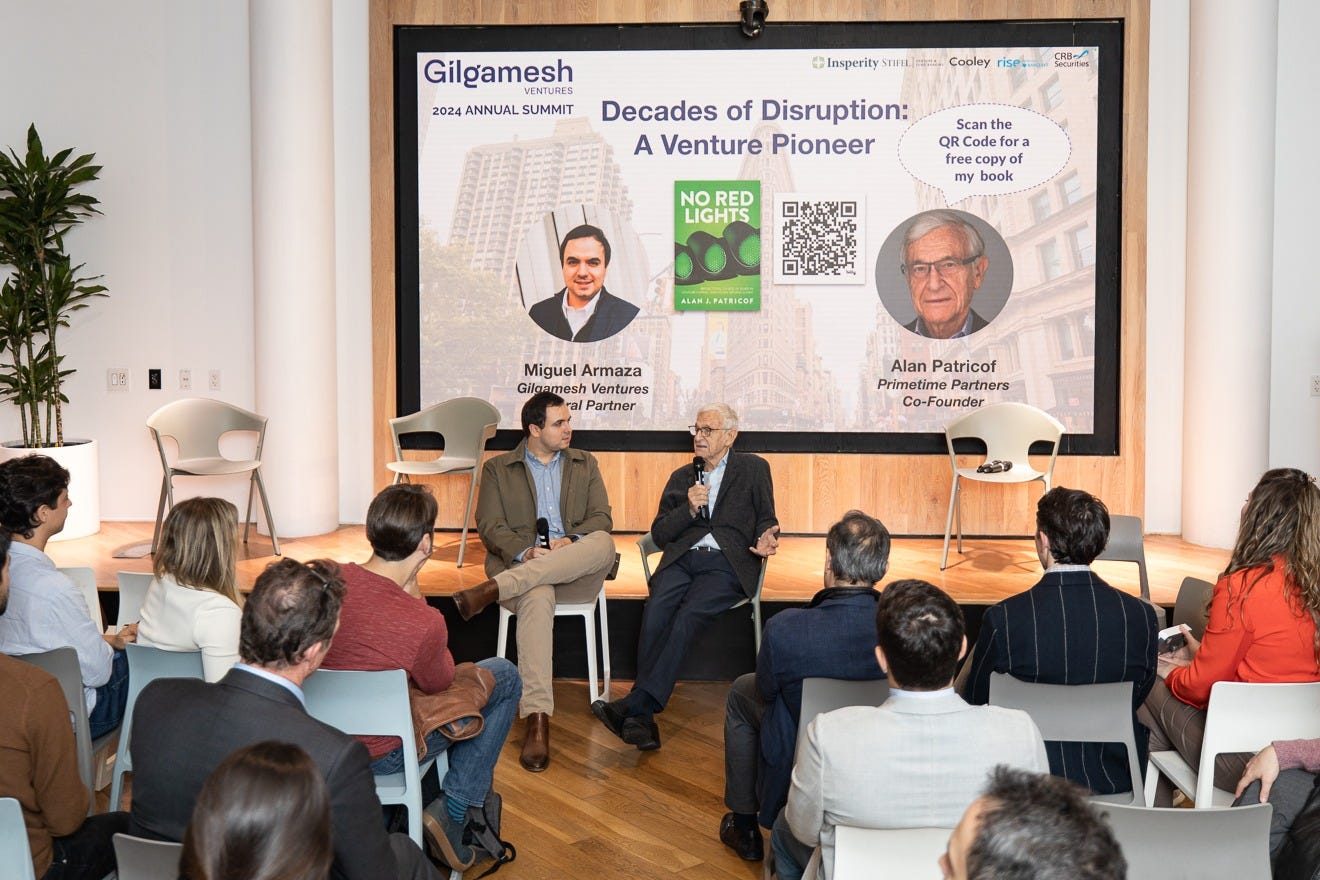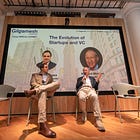This article is part of Fintech Leaders, a newsletter with almost 70,000 builders, entrepreneurs, investors, regulators, and students of financial services. I invite you to share and sign up! Also, if you enjoy this conversation, please consider leaving a review on Apple Podcasts or Spotify so more people can learn about us.
Today we have a special episode with an absolute legend, Alan Patricof, Co-Founder of Primetime Partners, Greycroft, and Apax Partners. It’s hard to explain just how important Alan has been for tech and VC. He’s one of the true pioneers in venture capital worldwide, having started his first VC firm in the 1970s, Alan Patricof and Associates, which later became Apax Partners and currently has over ~$80Bn AUM.
Alan is an inspiring figure, not only because of his success in the business world but also because of his vitality and contagious optimism. He joined us a day after his 90th birthday and candidly, he had more energy than most people I know.
We recorded live on stage at Barclays Rise in NYC for the 2024 Gilgamesh Ventures Summit, an annual meeting where we gather over 150 limited partners, founders, investors, and friends for a series of events and discussions about the future of tech and financial services.
In this episode, we discuss:
The early days of Venture Capital and Tech in the 1970s and beyond
“The first year we started, we had what is called a POTS, a plain old telephone system. If the phone rang, it would be a miracle… You really had to go out and find people who would take your money. Honestly, it was almost like begging them,”
Back in the 1970s, Alan launched his first venture capital fund of $2.5 million—Alan Patricof and Associates. This was back at a time when the term "venture capital" didn’t really exist and it was instead called the “Deal Business”. Unlike today's robust supply of startup pitches flooding many investors' inboxes, early venture capitalists had to actively seek out entrepreneurs, often persuading, almost begging skeptical business owners to accept their investments. The notion of taking on partners, dealing with legal agreements, and formalizing accounting practices was foreign and unappealing to many founders at the time.
It was an arduous journey for Alan. His second fund amounted to just $12.5 million, utilizing government capital through an SBIC government program, and his third fund was $25 million. It wasn't until the 1980s that he broke into the $100 million range. The slow pace was attributed to skepticism and a lack of understanding about venture capital. Lawyers and investors were cautious, as the idea of funding startups was a novel and risky proposition.
Another big difference of venture capital investing back then, was a vibrant over-the-counter (OTC) small-cap market. This was the lifeblood of emerging companies. Patricof's first IPO was with Datascope, a medical electronics firm generating around $2 million in revenue at the time of the IPO (or about $10 million in 2024 dollars!). The company went public with a total market cap of $10 million, raising just $1 million—mostly from individual investors. Trading was a personal affair, conducted over the phone using "Pink Sheets" to track market makers. This is a wild and sharp contrast with today's landscape, where institutional investors dominate, requiring minimum positions of $25 million to $100 million per investor. The OTC market's decline has made it nearly impossible for smaller companies to go public, as the IPO standards have increased significantly and companies require close to $1 billion in revenue to go IPO on the NYSE or Nasdaq.
Alan grew up in NYC and built his career in NY – how was the city back then?
" If you went into Central Park, there was never anyone in there. Can you imagine?"
Alan was born in 1934 and grew up in the Upper West Side of NYC. He is a proud New Yorker and built an extraordinary career in the city. He reminisced about a time when Central Park was virtually empty and it was common to see horses as a mode of transportation around town. Growing up on Central Park West, Alan and his friends used the park as their personal playground. Sleigh riding during snowy winters was a common pastime, and bicycles and horseback riders enjoyed unimpeded paths where cars rarely ventured. The city itself experienced heavy snowfall that could immobilize parked cars for entire winters, as plows would bury them under mountains of snow.
Building primetime partners to invest in the fastest growing market, people over 60
“The fastest growing part of our population is really the older, over 60 market, which is growing a lot faster than those under 18.”
Alan's journey into the over-60 market was profoundly personal. After his late wife battled Alzheimer's for 12 years, he witnessed firsthand the challenges and unmet needs of the aging population. This experience highlighted the fastest-growing demographic segment—those over 60, who are living longer than ever, have substantial spending power, and are increasingly tech-savvy. These are the ingredients for a compelling opportunity to innovate and invest in services catering to this group. When Alan learned that Abby Levy shared his vision—bolstered by her background as the founding president of Thrive Global—they teamed up to launch Primetime Partners. Their fund focuses on early-stage startups serving the elderly, operating as a horizontal fund that cuts across industries to meet the diverse needs of older adults.
However, Patricof and Levy are not just investing; they aim to shift perceptions and challenge the ageism ingrained in society and the venture capital industry. There is a pervasive bias that sidelines older adults in favor of younger demographics like Millennials or Gen Zers, who are often seen as the primary drivers of innovation and consumer spending. At Primetime Partners, they have set out to prove that the over-60 market is not only viable but also lucrative and ripe for innovation.
Staying healthy. How Alan keeps fit, focused and is closing deals at 90 Years Old
“I keep active... staying relevant and working regularly, is a big part of it.”
Alan Patricof is as active as ever and it’s a joy to hang out with him. He attributes his healthy longevity and sustained success to an unwaveringly active lifestyle and a relentlessly positive attitude. He begins each day with enthusiasm, rejecting negativity regardless of the weather or circumstances. Physical activity is crucial to his routine: he walks daily with his wife, works out with a trainer three times a week, and attends Pilates classes once a week. This commitment to fitness is not merely about health but also about maintaining energy and staying engaged.
He emphasizes the importance of staying relevant by remaining deeply involved in his work and cultivating a wide array of interests. He is an avid reader, consuming publications like the Financial Times, The New York Times, The Wall Street Journal, Forbes, and The Atlantic on a daily basis. His curiosity also extends beyond his industry; Alan is interested in new products, services, and what others are doing around him. This intellectual curiosity and constant enthusiasm keeps his mind sharp and allows him to continue moving at full speed through life – no red lights!
Why your reputation is all that matters in this business… and a lot more!
“Everything in life is cumulative. This, I really believe it very strongly… people say, How did you raise your last fund in just three months? I say to them, 50 years and three months!”
Alan reminds us of the profound impact of personal gestures in building a lasting reputation. It’s a common trait among influential figures like Bill Clinton to add handwritten messages to typed letters, enhancing their personal connection with recipients. Similarly, Warren Buffett is known to return letters with handwritten notes at the bottom. These two examples carry even more weight, when you realize Alan knows both of them personally.
Patricof himself maintains a strict policy of returning every phone call within the day he receives it—or the next day at the latest and has a strong disdain for those who neglect this professional courtesy. He believes that these small acts of consideration set individuals apart and leave an indelible mark on others.
He firmly believes that "everything in life is cumulative," and he knows people never forget how they are treated—sharing anecdotes of individuals approaching him decades later to express gratitude for acts like returning their calls or agreeing to meetings when others wouldn't. He credits his enduring success and continued relevance at age 90 to this cumulative effect of consistently respectful and attentive behavior.
Alan’s Book - No Red Lights
Finally, Alan is also a successful published author, having released his autobiography in 2022. It was an inspiring read for me and I highly recommend it! Certainly a must read for anyone interested in the world of tech and VC.
Alan Patricof's memoir, "No Red Lights: Reflections on Life, 50 Years in Venture Capital, and Never Driving Alone," chronicles his remarkable journey as one of America's earliest venture capital pioneers. From his beginnings on Wall Street to founding New York Magazine and investing in groundbreaking companies like AOL and Venmo, he offers a behind-the-scenes look at the evolution of the industry over the past fifty years.
A prominent figure in New York City's social and political scenes, Patricof seamlessly combined his passions for the arts, politics, theater, and public service without sacrificing family or business success. This memoir serves as both an inspiring roadmap for young entrepreneurs starting their journeys and a motivational guide for older individuals looking to begin new chapters in their lives.
Want more podcast episodes? Join me and follow Fintech Leaders today on Apple, Spotify, or your favorite podcast app for weekly conversations with today’s global leaders that will dominate the 21st century in fintech, business, and beyond.
Previous Episodes You May Enjoy:




























Share this post